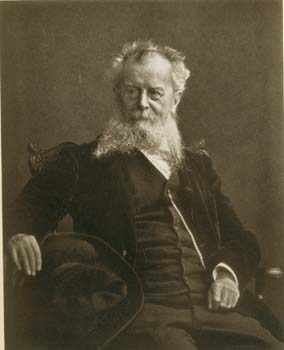Felix Dahn facts for kids
Quick facts for kids
Felix Dahn
|
|
|---|---|
 |
|
| Born | 9 February 1834 Hamburg, Germany
|
| Died | 3 January 1912 (aged 77) Breslau, Germany
|
| Spouse(s) |
Sophie Fries
(m. 1835–1898)Therese Dahn
(m. 1873–1912) |
| Parent(s) |
|
Felix Dahn (born February 9, 1834 – died January 3, 1912) was a German professor, writer, poet, and historian. He was known for his strong German nationalist views.
Life and Education
Felix Dahn was born in Hamburg, Germany. His parents, Friedrich and Constanze Dahn, were famous actors. In 1834, his family moved to Munich. Felix studied law and philosophy at the University of Munich. He later earned his law degree in Berlin at the Humboldt University of Berlin.
In 1857, Dahn became a lecturer in German Law in Munich. He then became a professor at the University of Würzburg in 1863. Later, in 1872, he became a full professor at the University of Königsberg.
Felix Dahn first married Sophie Fries, an artist, and they had a son. He later married Therese von Droste-Hülshoff in 1873, after divorcing his first wife.
In 1888, Dahn moved to the University of Breslau to work as a professor. In 1895, he was chosen to be the university's rector, which is like a president. He was also an active member of groups that promoted German nationalism.
Felix Dahn received special honorary degrees in Medicine and Philosophy for his achievements. He passed away in Breslau in 1912, just before his 78th birthday.
His Writings
Felix Dahn wrote many important works. His historical writings helped people understand the Migration Period in Europe. This was a time when many different groups of people moved across Europe. His book, Prehistory of the Germanic and Roman Peoples, first came out in 1883. It was so important that shorter versions were printed for many years.
From the 1860s, Dahn often wrote for Die Gartenlaube, a very popular German family magazine. His historical novels, which often had nationalist themes, were widely read. These books were very popular and helped shape ideas about German identity at the time. For example, his 1876 novel, Ein Kampf um Rom, was well-known for its strong views on German heritage.
Dahn also published many poems. Many of his poems showed his nationalist feelings. For instance, his poem Mette von Marienburg described groups of people in a forest, showing his interest in different regions and peoples.
Besides his historical and literary works, Felix Dahn also wrote many books about law. These included topics like trade law and international law.
See also
 In Spanish: Felix Dahn para niños
In Spanish: Felix Dahn para niños
 | Lonnie Johnson |
 | Granville Woods |
 | Lewis Howard Latimer |
 | James West |

